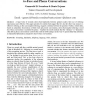Free Online Productivity Tools
i2Speak
i2Symbol
i2OCR
iTex2Img
iWeb2Print
iWeb2Shot
i2Type
iPdf2Split
iPdf2Merge
i2Bopomofo
i2Arabic
i2Style
i2Image
i2PDF
iLatex2Rtf
Sci2ools
INTERACT
2003
2003
Implicit Referring as an Indication of Familiarity in Face-to-Face and Phone Conversations
: A large body of research shows that familiarity between speakers makes their use of referring expressions more effective. This paper presents two studies that suggest that it’s also the other way around, i.e. effective referring, in this case implicit referring, suggests a relation between the speakers. Further, a third study, based on naturalistic observations of both work and private conversation, shows that implicit referring is used less when conversation is mediated by phone. Together the results indicate that the “distance” or “alienation” often felt in phone conversations could be the result of subtle changes in the way we speak rather than reduction in transmitted information compared to face-to-face conversations.
| Added | 31 Oct 2010 |
| Updated | 31 Oct 2010 |
| Type | Conference |
| Year | 2003 |
| Where | INTERACT |
| Authors | Gunnvald B. Svendsen, Bente Evjemo |
Comments (0)

